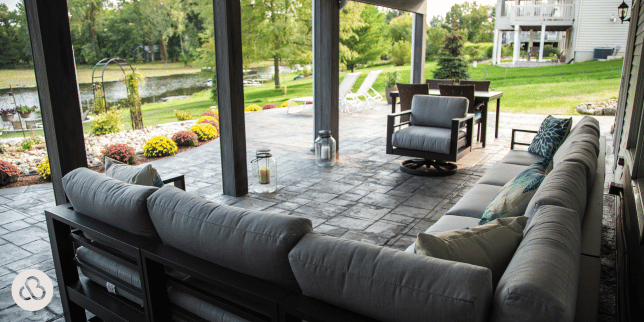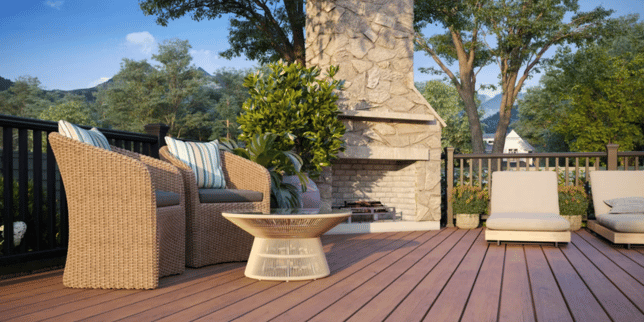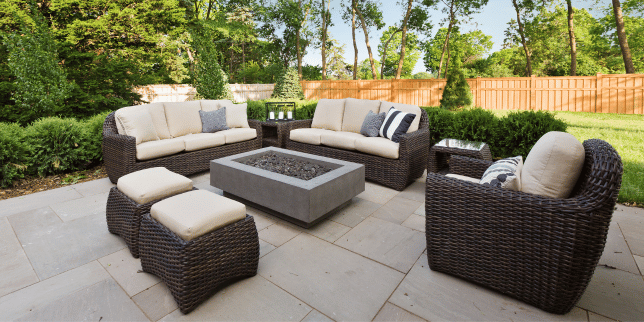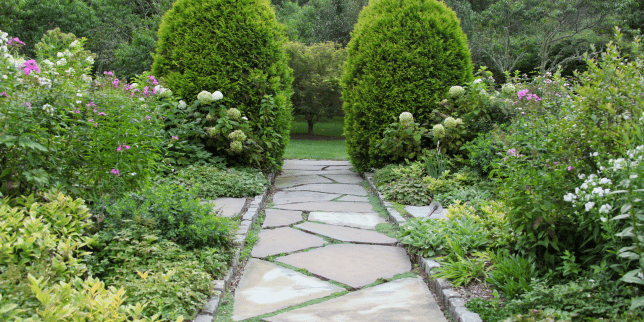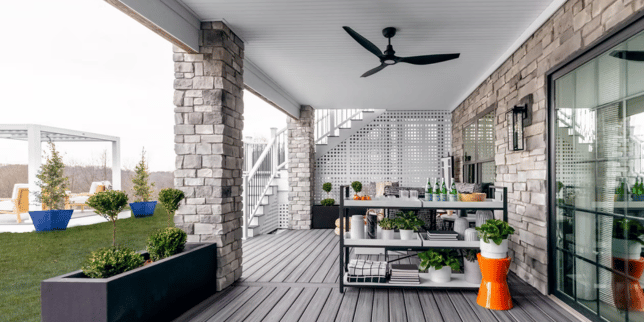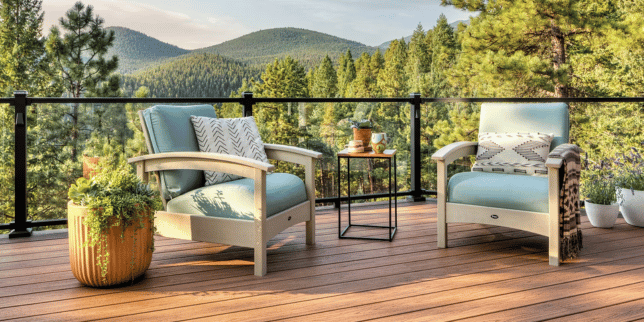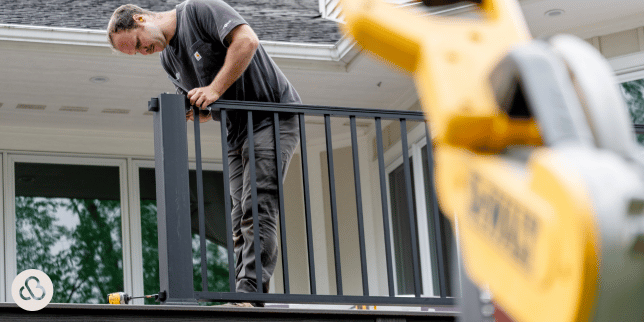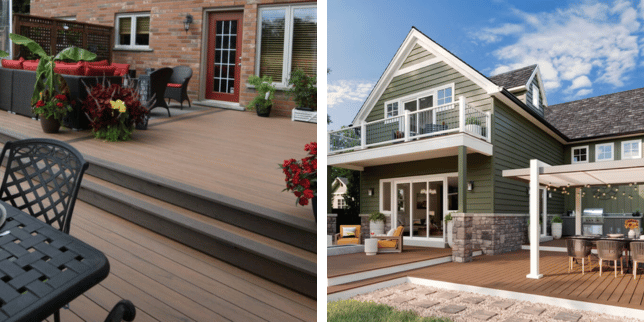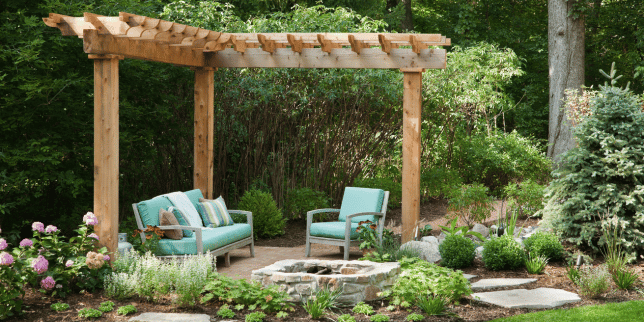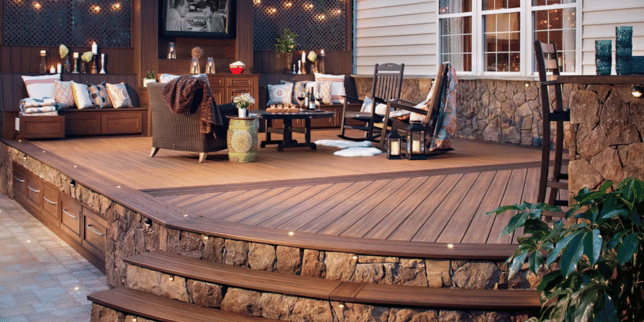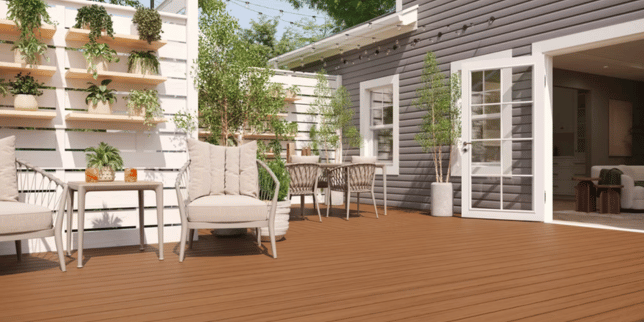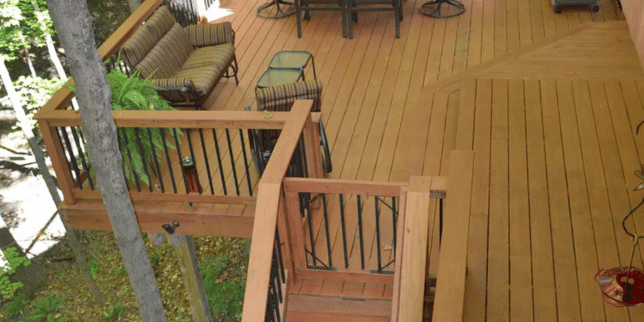The Complete Guide to Pool Decks: Best Materials, Costs, and Safety Tips
June 21st, 2025
6 min read
By Aaron King
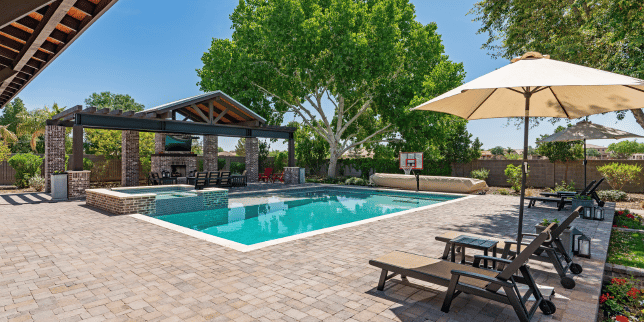
Planning a pool deck can feel overwhelming. You want a space that’s safe for your family, looks great, and withstands Michigan’s weather and wet conditions, but choosing the right materials and features isn’t always straightforward.
At Custom Built, we understand the importance of creating a pool deck that suits your lifestyle and keeps your loved ones protected. With decades of experience designing and building outdoor living spaces in the Greater Lansing and Boyne City areas, we’ve seen what works and what doesn’t when it comes to pool decks.
In this guide, we’ll walk you through the best materials, key safety features, and cost considerations so you can make confident decisions for a pool deck that’s beautiful, functional, and built to last:
6 Best Pool Deck Materials
1. Treated Lumber or Cedar
Natural wood can create a warm, classic look, but it requires regular maintenance and care to prevent splinters and damage from moisture or chemicals like chlorine. Wood can dry out, fade, and bleach, especially near pools, which means you’ll need frequent sanding and restaining.
Pros:
- Traditional, natural look
- Lower upfront cost than premium composites
Cons:
- High maintenance to avoid splinters and damage
- Susceptible to chemical bleaching and fading
- Needs regular sanding and sealing
Cost:
- Treated Lumber: Starts at $9:50 per sq. ft.
- Cedar: Starts at $13.50 per sq. ft.
2. Concrete
Concrete is one of the most popular and practical materials for in-ground pool decks. It can be poured as brushed, stamped, or colored concrete to create a clean, durable, and attractive surface around your pool. Brushed concrete offers a rough texture that reduces slipping, while stamped concrete can be customized with patterns and colors to elevate the look.
For above-ground pools, concrete often works best as a walkway leading to the pool rather than the pool deck itself, since you need decking material at the pool’s level.
Pros:
- Durable and long-lasting
- Customizable with stamping and coloring
- Textured finish enhances safety
Cons:
- Can crack if not properly installed or maintained
- Stamped and colored concrete costs more
- The surface can become hot in direct sunlight
Cost:
- Brushed concrete: $16 per sq. ft.
- Stamped and colored concrete: $40 per sq. ft.
3. Pavers
PC: Peacock Pavers
Pavers make for beautiful patio areas around pools with endless design options. However, pavers tend to collect dirt and sand between them, which can easily track into your pool on wet feet. Depending on the filler material between the pavers, you might increase the frequency of pool cleaning.
Pros:
- Visually appealing with customizable patterns
- Durable and replaceable individual units
Cons:
- Dirt and sand can easily track into the pool
- More maintenance is needed to keep it clean
Cost:
- Standard concrete or brick pavers: $10 - $25 per sq. ft.
4. Natural Stone
Natural stone is a popular choice for waterfront areas and can be stunning around pools. To prevent dirt tracking, it’s best to use concrete or other solid fillers instead of sand between stones. Maintenance is fairly easy, requiring regular spraying and gentle scrubbing to keep the stone looking natural and clean.
Pros:
- Beautiful, natural aesthetic
- Durable and long-lasting
- Easy to clean when properly installed
Cons:
- Dirt tracking if sand is used as filler
- Can be slippery when wet unless textured
Cost:
- Natural stone (e.g., flagstone) with proper installation: $20 - $40 per sq. ft.
5. Composite Decking
Composite decking is ideal for above-ground pools because it is safe for bare feet, low-maintenance, and visually appealing with many color options. Lighter colors also keep the surface cooler in the sun.
Composite decking around in-ground pools requires thoughtful planning to ensure long-term durability. These boards often have a wood-fiber core, which means they need proper airflow underneath to breathe and dry out. Without adequate framing and ventilation, moisture can become trapped, leading to mold, mildew, or surface discoloration.
Pros:
- Low maintenance with minimal upkeep
- Comfortable and safe for bare feet
- Color options and cooler surfaces with lighter boards
- Warranty coverage, including board replacement
Cons:
- Higher upfront cost than basic treated wood
- Requires below-grade framing for in-ground pools
Cost:
- Composite decking boards and installation (Trex Transcend Composite Decking): Starts at $25 per sq. ft.
6. PVC Decking
PC: National Decking
PVC decking is a strong contender for poolside use (and docks) thanks to its water-resistant construction and low-maintenance appeal.
Made entirely from synthetic materials, PVC boards don’t absorb moisture, making them ideal for wet environments like in-ground pool surrounds. They’re also highly resistant to mold, mildew, and surface staining, common issues in high-moisture areas.
Pros:
- 100% moisture-resistant
- Won’t warp, swell, or splinter
- Cooler underfoot options available
- Easy to clean with mild soap and water
Cons:
- Can feel less natural than wood or composite
- Higher upfront cost than composite
- Limited texture options may be slippery when wet (check for slip-rated options)
Cost:
- PVC decking with professional installation: Starts at $40 per sq. ft.
4 Pool Deck Safety Features You Should Always Include
1. Textured Concrete Finishes
PC: Concrete Network
Concrete surfaces around pools should always have a textured finish. Whether brushed, stamped, or broomed, texture prevents slipping on wet surfaces. Smooth concrete may be attractive, but it poses a safety hazard when wet.
2. Stair Tread Covers for Composite Decks
PC: HandiTreads
For composite decks near pools, non-slip tread covers on stairs are essential. Wet feet on stairs are a leading cause of slips and falls. These covers add traction and protect your family and guests.
3. Lighted Walkways and Handrails
PC: DecksDirect
Lighting around your pool deck ensures everyone can see where they’re going after dark, reducing accidents. Lighted handrails provide support and improve nighttime visibility.
4. Fencing with Self-Closing, Locking Gates
PC: Guardian Pool Fence Systems
Local safety codes require fenced pool areas with gates that close and lock automatically. This is critical to keep children and pets out when no one is supervising, and is a key safety feature you cannot skip.
Add-On Features to Make Your Pool Deck Functional and Enjoyable
For Above-Ground Pools:
- Built-in benches and seating to provide comfortable spots for rest and supervision
- Drink rails around the deck perimeter are perfect for entertaining guests
- Planter boxes and decorative borders to soften hard edges and add greenery
- Lighted steps and handrails for safety and ambiance after dark
For In-Ground Pools:
- Stamped or bordered concrete finishes for an upscale look that complements your home
- Integrated landscaping to define the space, provide shade, and reduce debris
- Lighted pathways to enhance safety and create inviting night-time spaces
Permits & Local Code: Don’t Skip This Step
Proper permitting is crucial. Before starting your project, make sure you or your contractor pulls all required permits. Local authorities often require:
- Pool fencing with self-closing, locking gates
- Walkways around in-ground pools that meet code for width and surface
- Inspections during construction to ensure compliance
Failing to follow these rules can result in stop orders, fines, or having to undo work. Proper permits protect you, your family, and your investment.
How to Choose the Right Pool Deck Contractor
A well-built pool deck starts with the right professional. Use these tips to find a contractor who can deliver a safe, long-lasting outdoor space:
- Look for Specialized Experience
- Choose someone with direct experience building pool-adjacent structures, especially with the materials you're considering (composite, concrete, pavers, etc.).
- Ask to see portfolio examples of past pool deck projects.
- Prioritize Code Knowledge and Permitting
- Ensure your contractor understands local building codes related to pool safety, such as fencing requirements and non-slip surface standards.
- They should handle permitting on your behalf and explain what inspections will be required.
- Ask the Right Questions
- Request references from clients who’ve completed similar projects.
- Confirm they offer labor warranties or long-term service support.
- Make sure they carry proper licensing and insurance for residential outdoor work.
- Expect Clear Communication and Documentation
- Look for a detailed, written proposal outlining materials, labor, timelines, and pricing.
- Your contractor should provide clear expectations for the construction process and a point of contact for questions.
- Evaluate Their Long-Term Commitment
- Choose a contractor who stands behind their work and is available if issues arise post-completion.
- Long-term support should be part of their business model, not an afterthought.
Think Long-Term: Invest in Durability and Safety
The cheapest materials might seem attractive upfront, but can lead to frequent repairs and replacements. Investing a bit more in composite decking or textured concrete means fewer headaches and longer-lasting enjoyment.
A well-built, safe, and beautiful pool deck enhances your home and creates a summer retreat your family will love for years.
Next Steps to Remodeling Your Outdoor Living Space
Your pool deck is more than just a surface. It’s a space where your family gathers, plays, and makes lasting memories. Safety, durability, and style all matter when choosing materials and features.
By understanding your options, from concrete and composite decking to natural stone, and prioritizing safety and local codes, you can create a pool deck that suits your lifestyle and withstands years of use.
At Custom Built, we’re committed to helping Greater Lansing and Boyne City homeowners design and build outdoor spaces that bring joy and peace of mind.
Ready to explore your pool deck options? Contact us for a free design consultation, and let’s start planning the perfect space for your family this summer.
Now that you know more about your pool deck material options, let’s explore how much deck lighting costs, the top pergolas, and the best outdoor heating ideas:
- How Much Does Deck Lighting Cost in Michigan? - Discover how much Trex and other deck lighting options cost and what affects the estimate.
- Top 4 Pergolas for Your Michigan Outdoor Living Space - Discover the most popular pergola options to elevate your deck or patio.
- Top 8 Outdoor Heating Ideas for Your Deck or Patio - From frigid winter days to cool summer nights, these outdoor heating options will keep your living space comfortable year-round.
Aaron has been in the building industry his entire life. He worked in his family’s housing business growing up in Dewitt, MI, and for nearly 40 years, built homes in the Mid-Michigan area. He has also worked with the Greater Lansing Home Builder’s Association since he was 18 years old.














